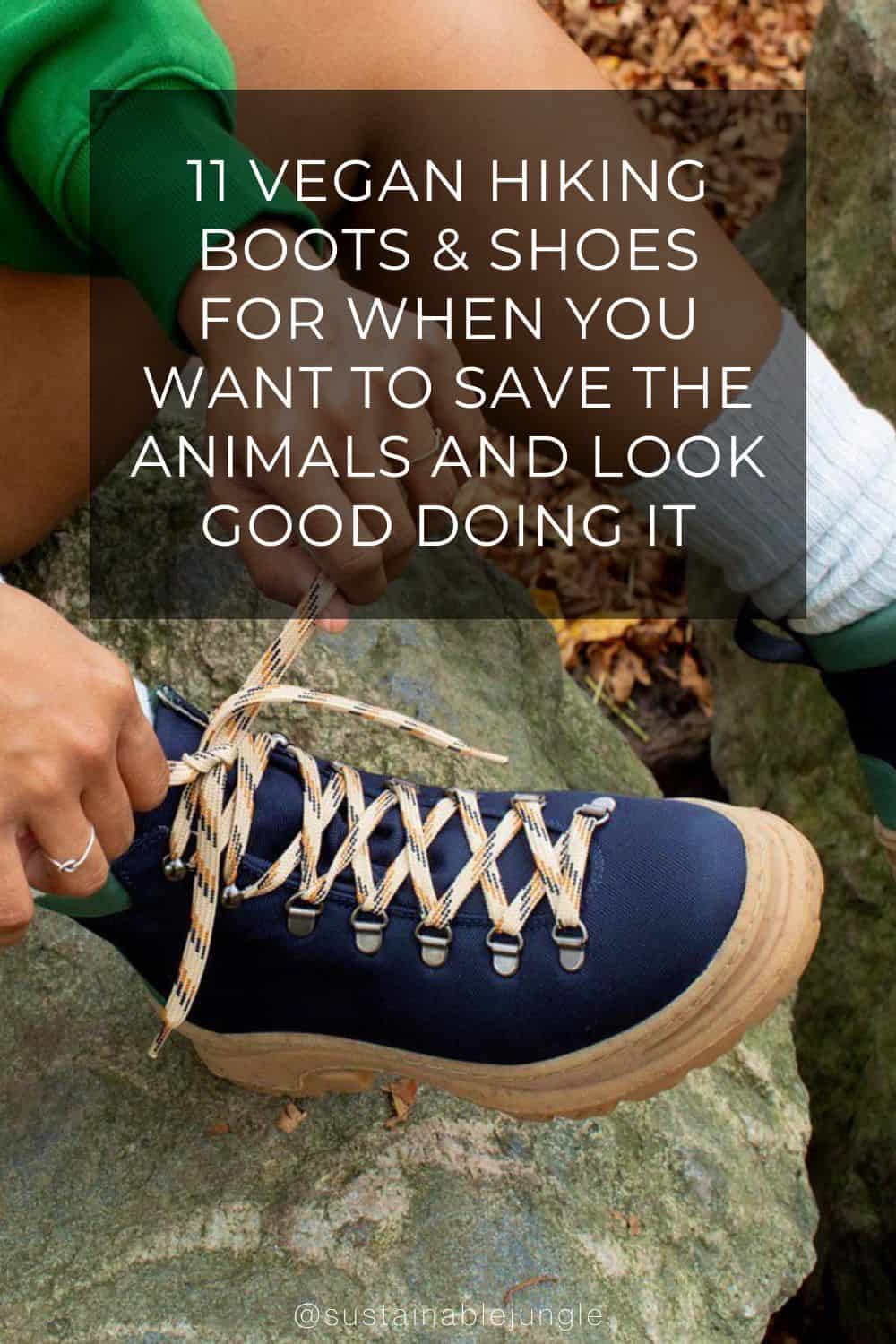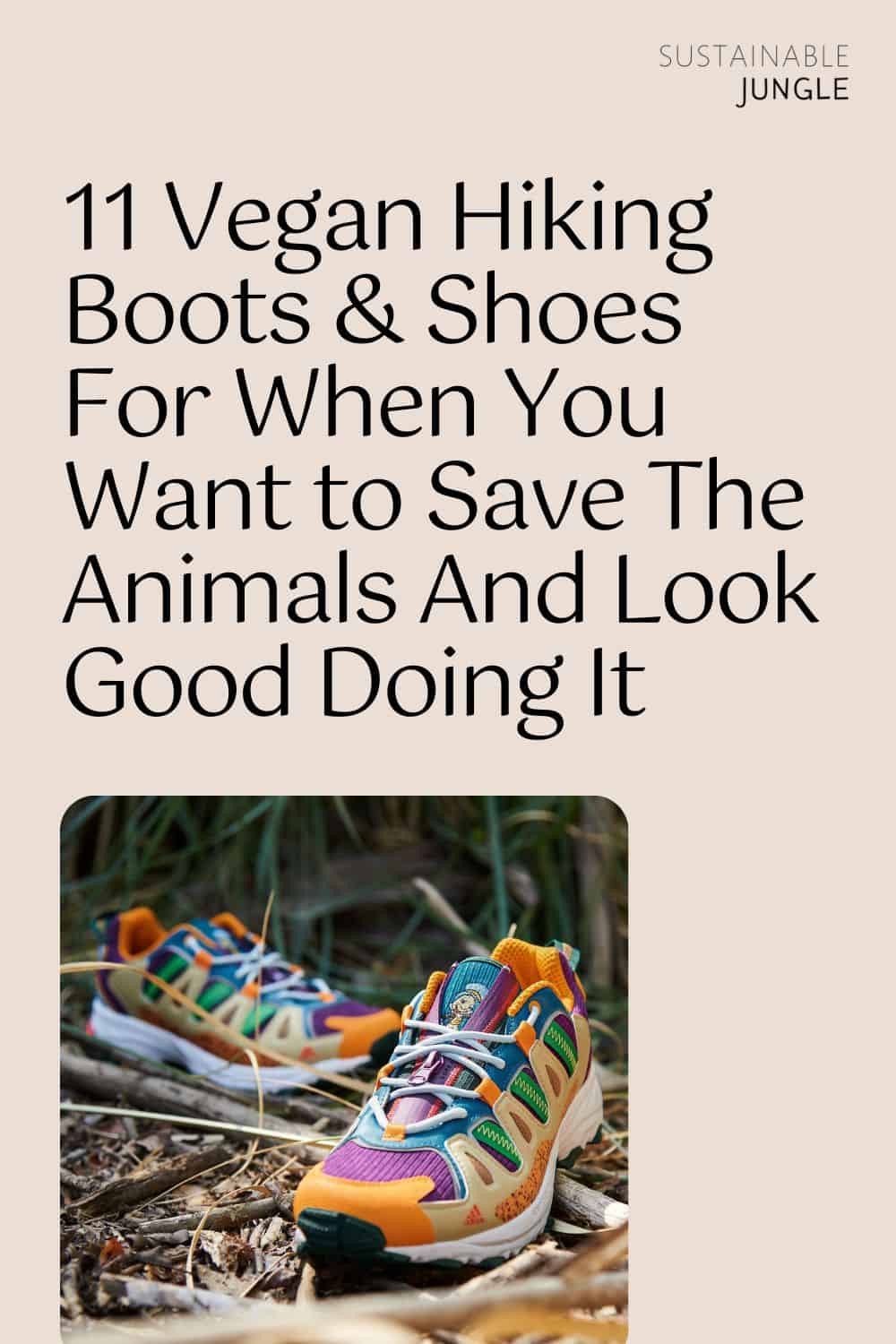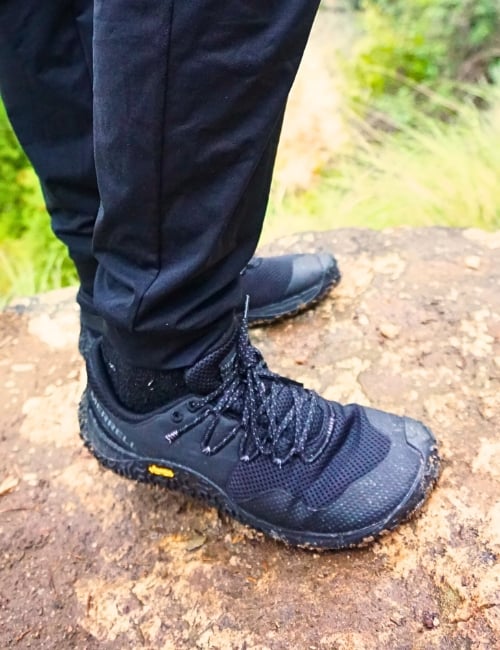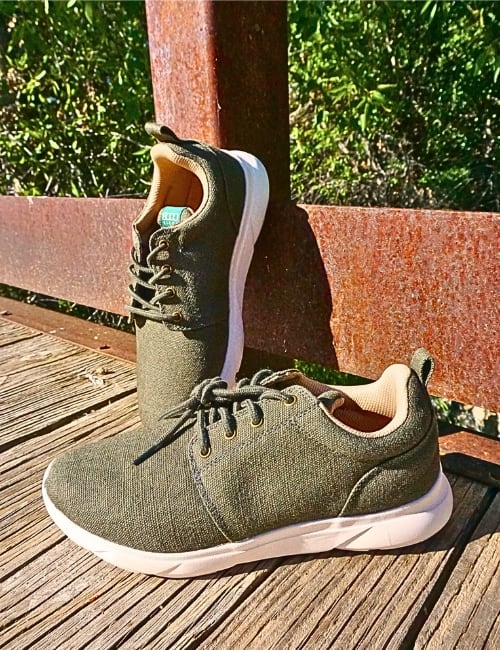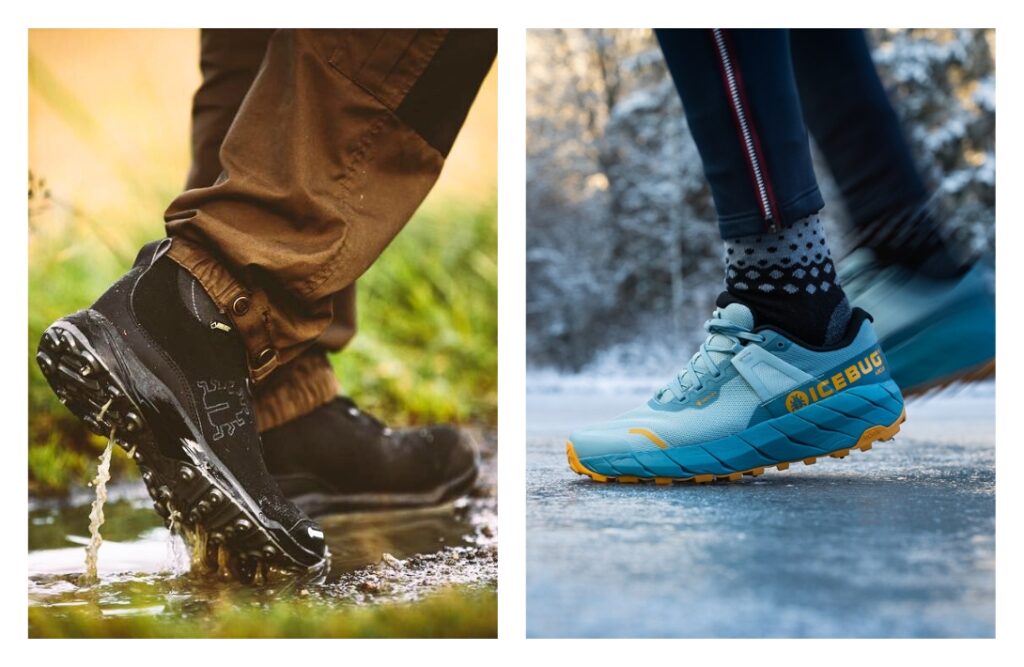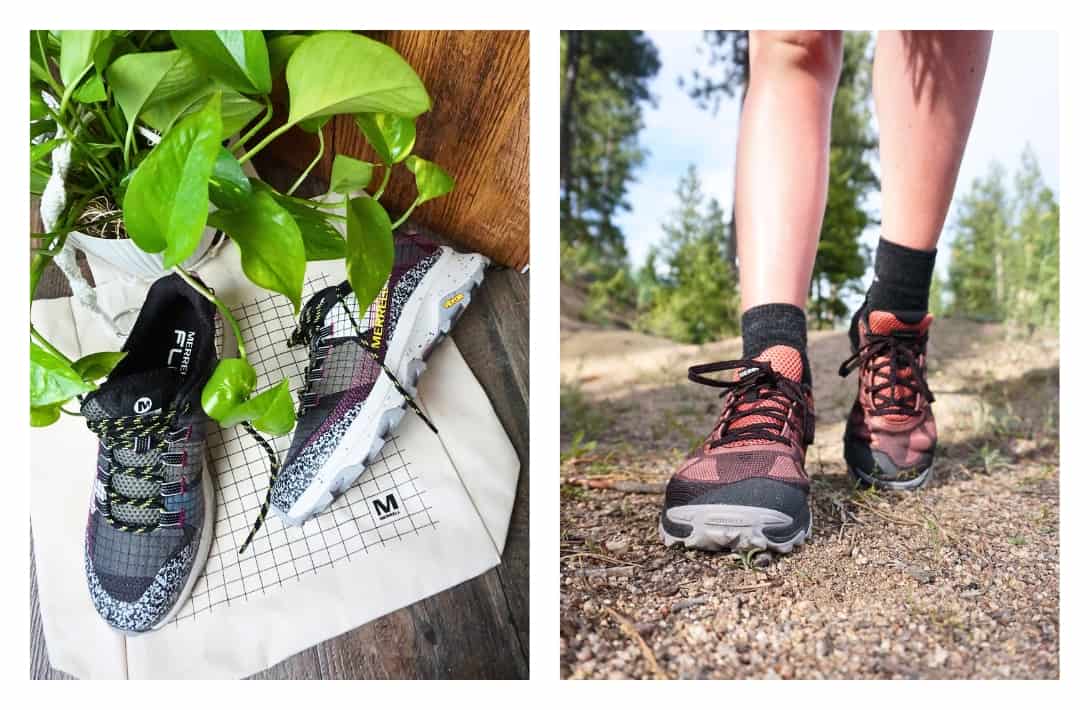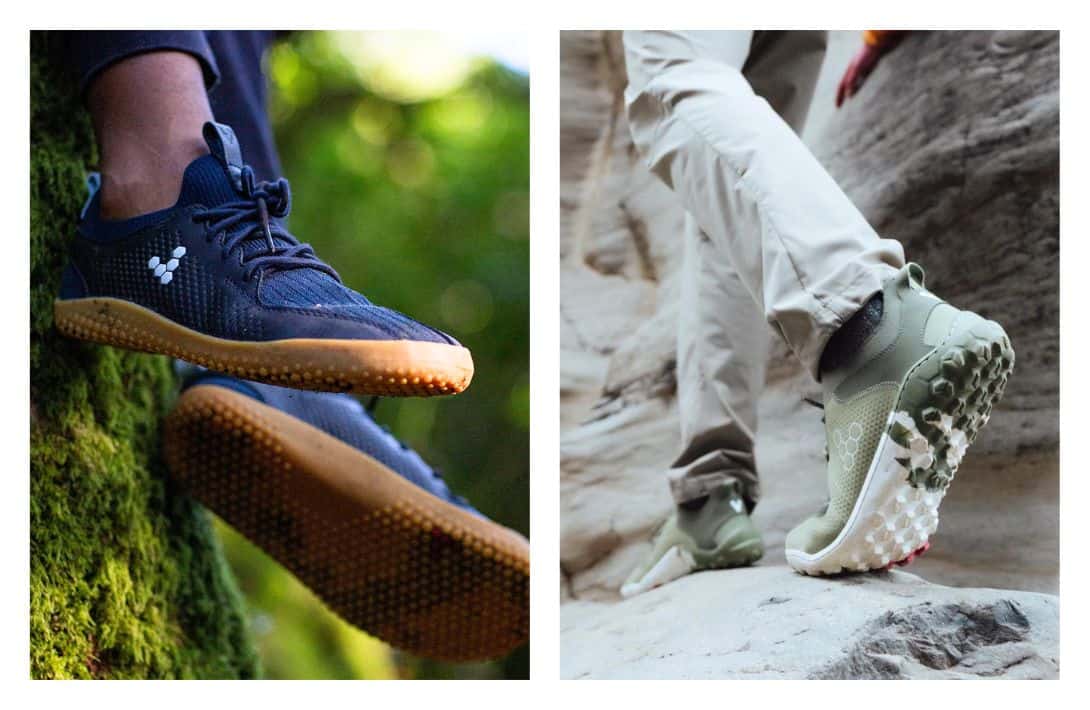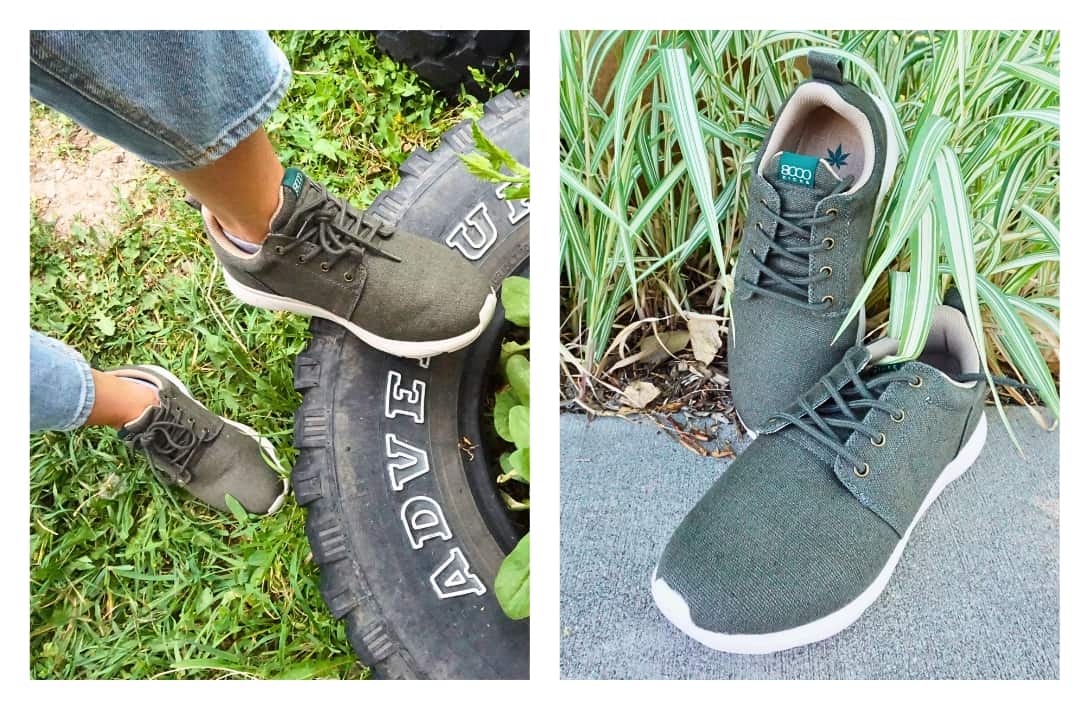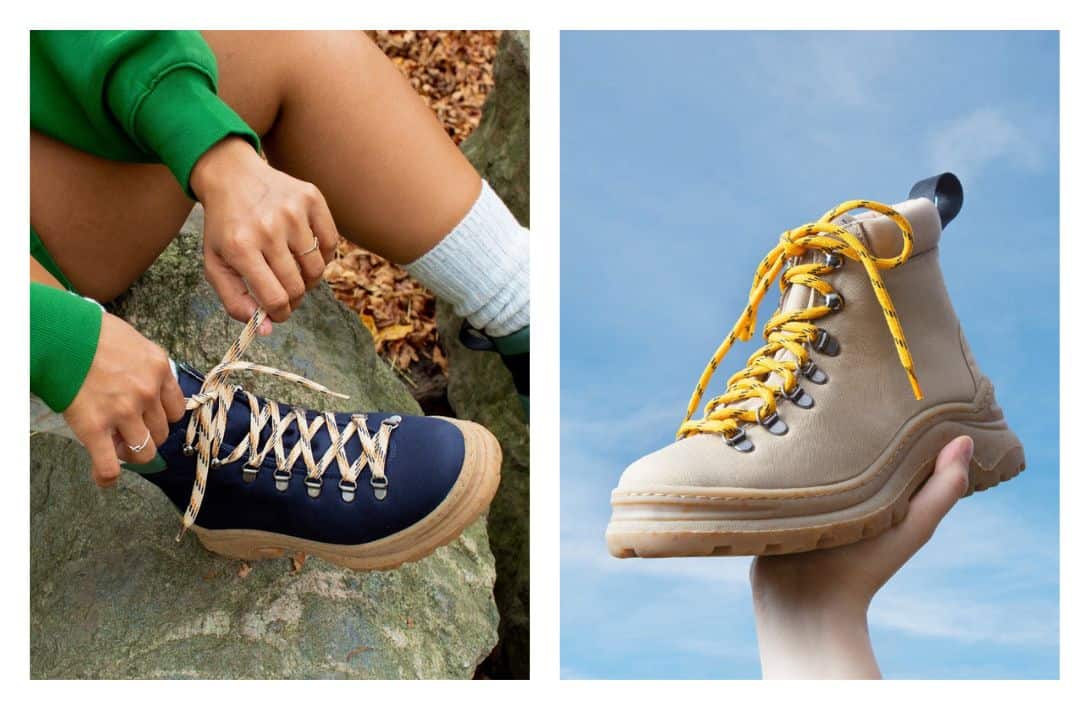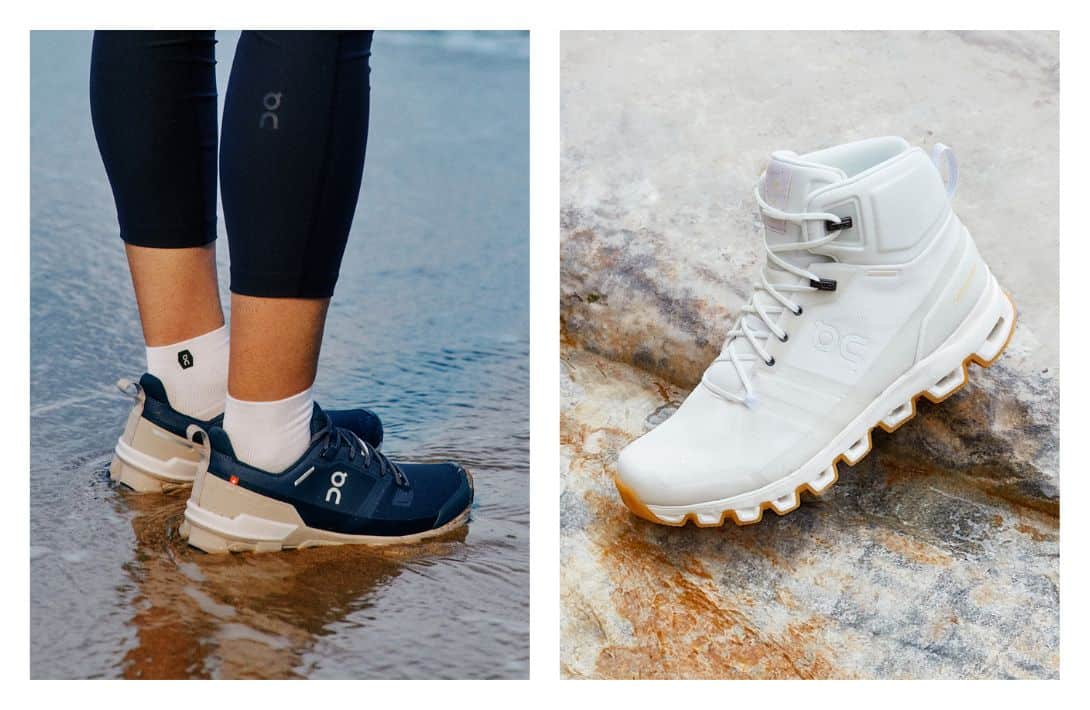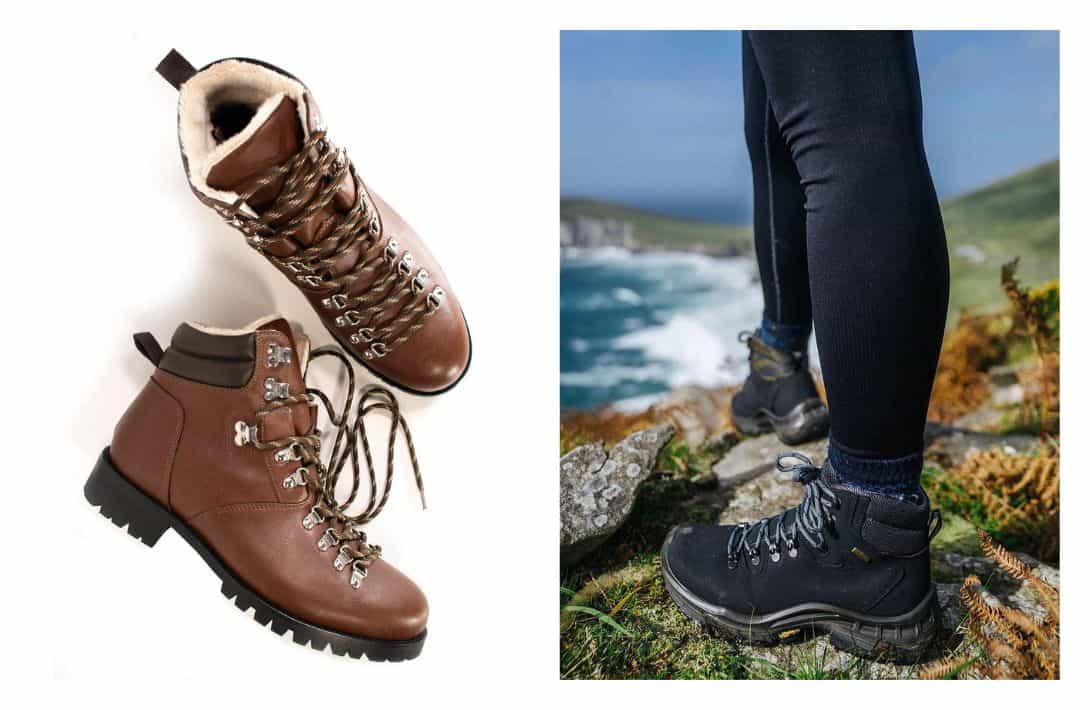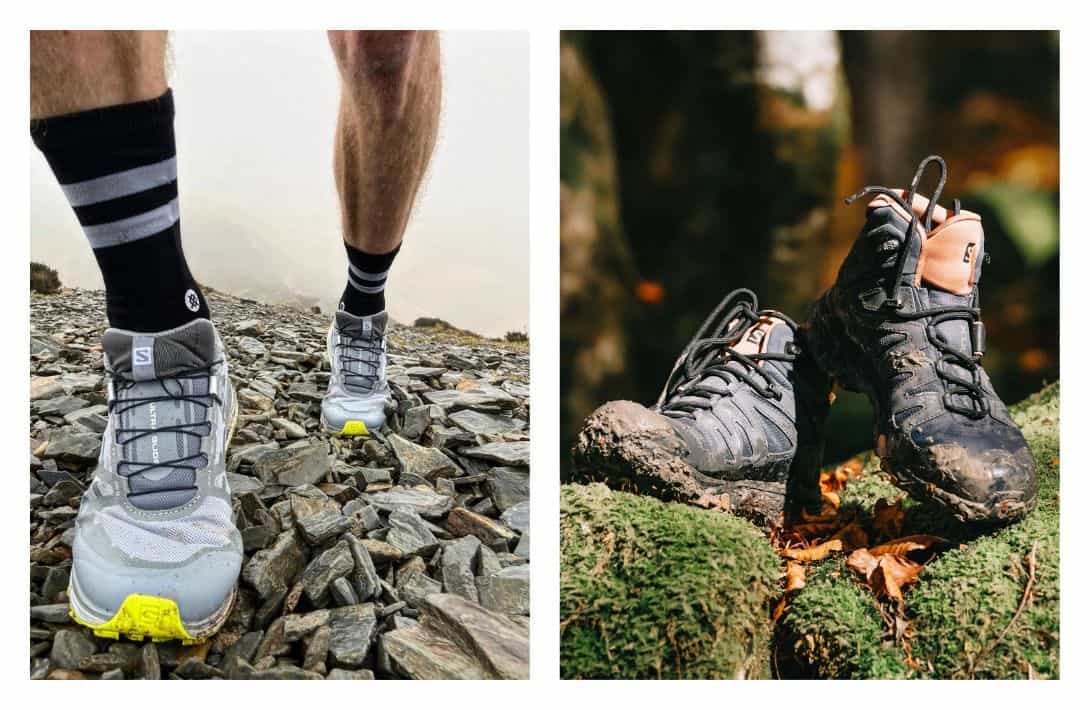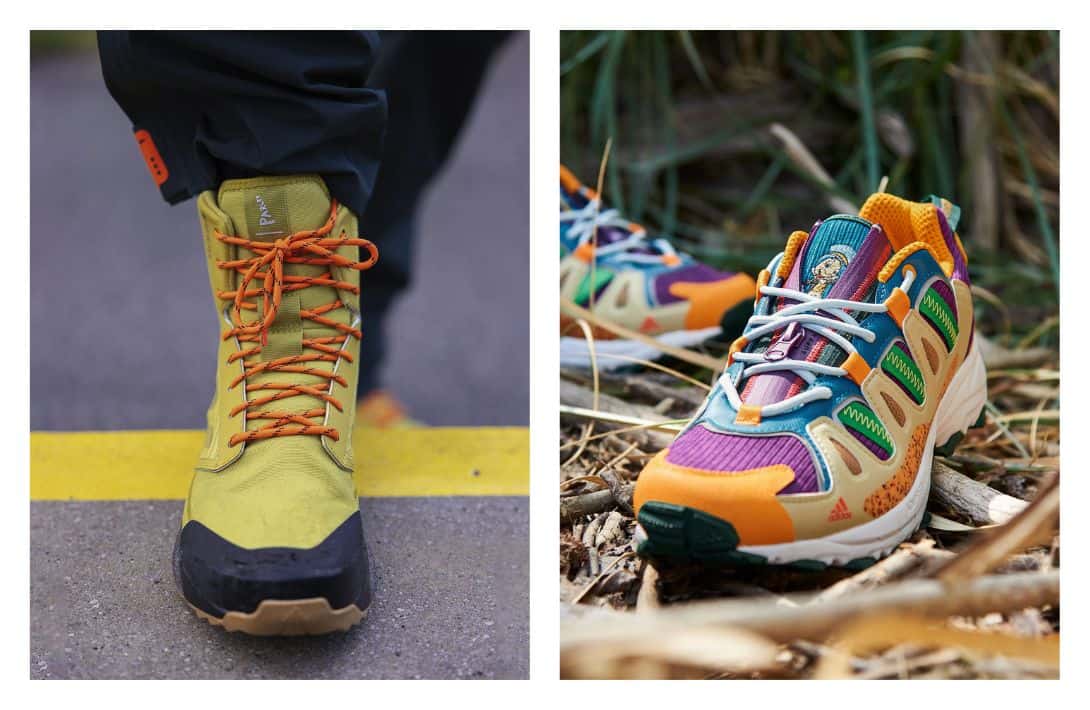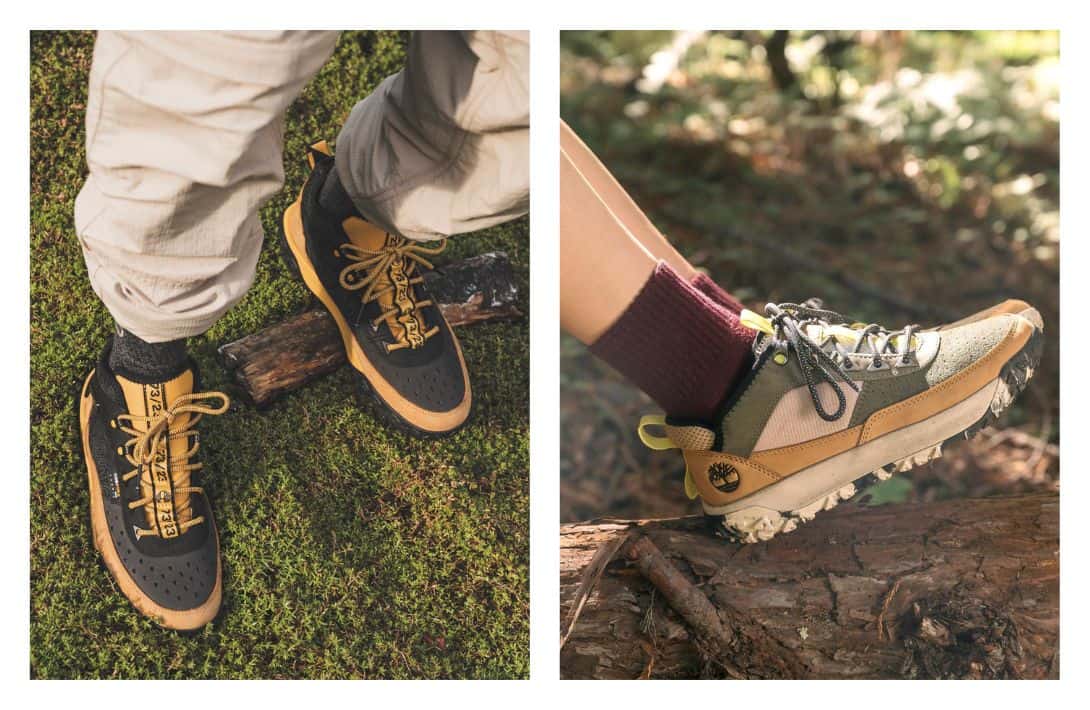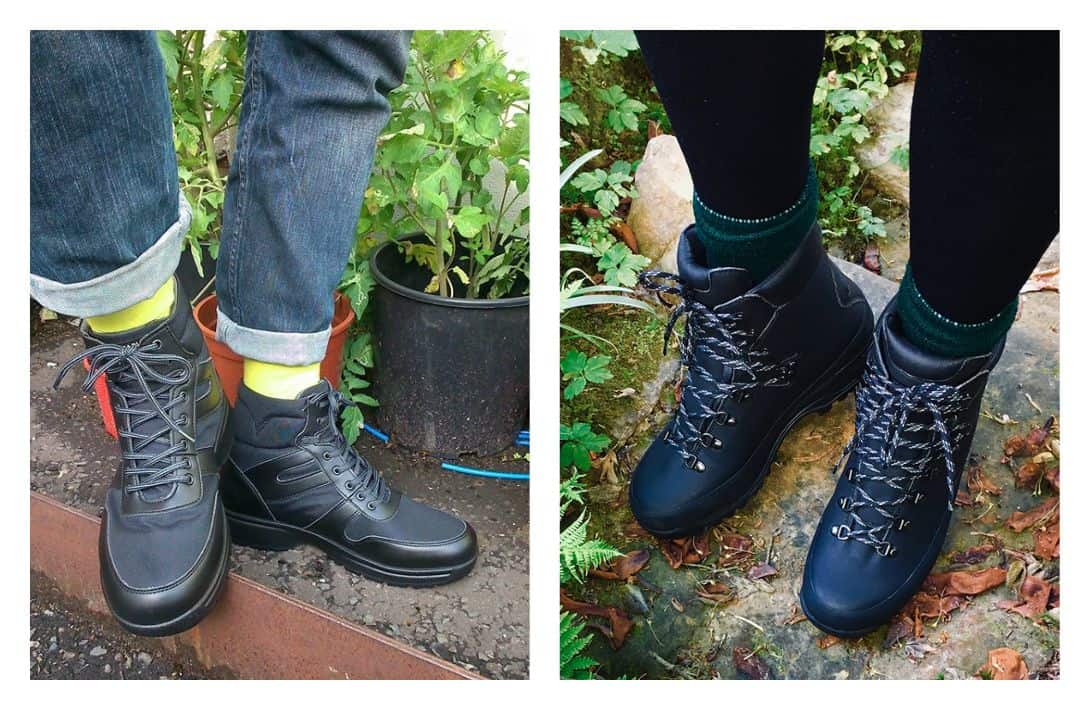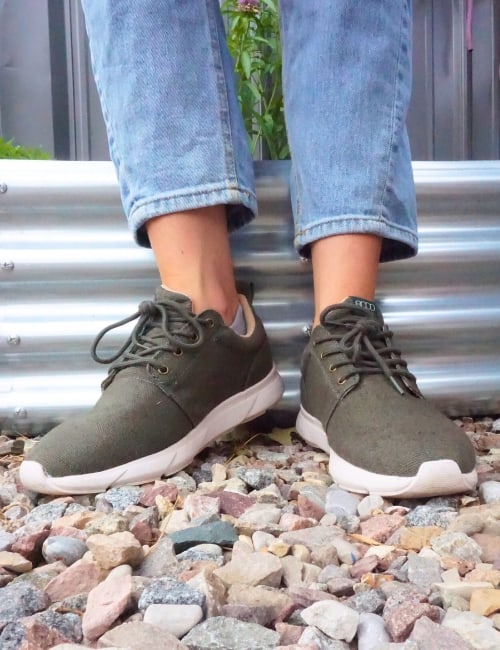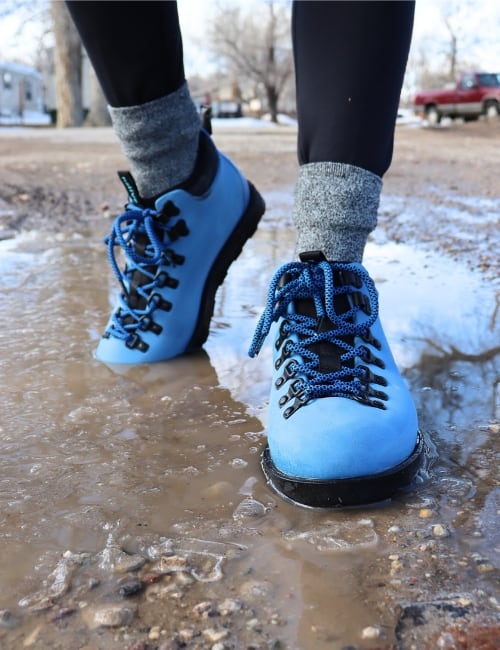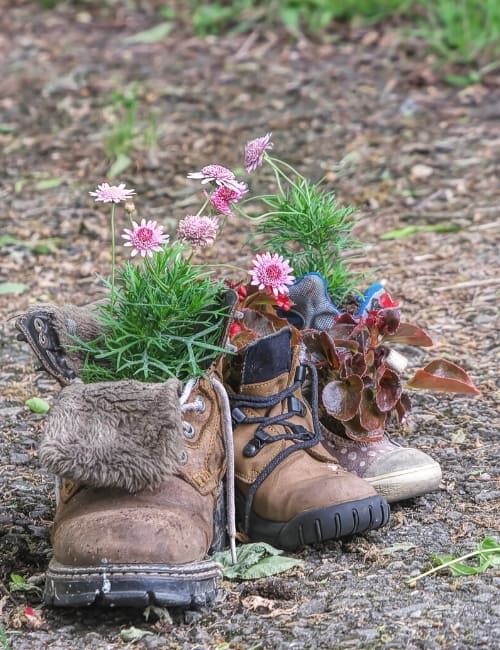11 Vegan Hiking Boots & Hiking Shoes For The Most Ethical Trekking
What’s worse than rolling an ankle?
Rolling your ankle in a low-quality boot that fails to support your ankles as much as it does animals.
Tell toxic leathers and animal-based glues used in traditional hiking boots to “take a hike” by strapping on some vegan hiking boots and shoes for your next wander into the wild.
But with so much of the outdoor footwear industry relying on leather, finding where to buy vegan hiking boots is about as easy as that last “easy” five-mile hike you went on.
Don’t worry though. We’ve compiled a list of the best vegan-friendly brands, so you can take a walk on the veg side.
Everything we recommend to you on Sustainable Jungle is independently researched and we ask all brands to confirm their claims. To avoid waste, we test products on an as needed basis. This post contains affiliate links. If you buy something through our links, we may earn a small commission. Learn more about why we do this here.
The Top Vegan Hiking Boots To Take You To The Top
With ethically sourced recycled materials and unique performance features like winter traction spikes, Icebug’s vegan hiking boots are a step above the rest.
Vegan’s namesake, Will’s Vegan Store is on-point. Their catalog of vegan hiking shoes is durable, responsible, and long-lasting.
On has sights set on the highest peak of shoe sustainability, which they’re pursuing through innovative technology—zero waste subscription shoes and carbon captured EVA foam, anyone?!
Scale down to the bottom to see how we found the best vegan walking boots.
The Full List Of Vegan Hiking Boots
- Icebug | Visit Store
- Merrell | Visit Store
- Vivobarefoot | Visit Store
- 8000Kicks | Visit Store
- Thesus | Visit Store
- On | Visit Store
- Will’s Vegan Store | Visit Store
- Salomon | Visit Store
- Adidas Terrex | Visit Store
- Timberland | Visit Store
- Vegetarian Shoes | Visit Store
1. Icebug
About Icebug
Price Range: $139–$239
Icebug creates some of the best vegan hiking boots money can buy, no matter the season.
From trail runners to waterproof vegan hiking snow boots, their products are at the pinnacle of outdoor performance.
The ankle supporting Stavre BUGrip GTX is made from animal-free materials and available in studded and non-studded options, so you can wear them year round.
Icebug’s Ethical & Sustainability Practices
Materials:
Icebug is at the forefront of sustainable material innovation, using BLOOM™ foam in their insoles and midsoles, a product made of algae biomass.
Uppers, lining, and laces are made of 100% GRS-certified recycled PET, while the outsoles are 20% recycled rubber blended with natural rubber.
Some feature toe reinforcements made from recycled plastic.
Many of their vegan waterproof hiking boots utilize a synthetic GORE-TEX membrane, but it’s both OEKO-TEX and bluesign®-approved, as many of their fabrics and solution dyes are.
Not all are vegan-friendly hiking boots, however, so look out for models with LWG leather or wool padding.
Supply chain & labor practices:
Icebug works with four primary assembly factories located in Vietnam and China.
Per their Fair Wear Foundation membership, all entities are audited regularly to the Fairwear Code of Labour Practice.
Carbon commitments & green practices:
Aiming to halve emissions by 2030, Icebug measures the full scope of their emissions, including business travel, product manufacturing, and transportation.
A Certified B Corp, they combine sustainability and traceability with Follow the Footprints, a scannable QR code to help customers see where products are made and their impact.
Replacement components are available to keep shoes in circulation longer.
Community & charitable giving:
Through 1% for the Planet, they support pro-climate organizations like Protect Our Winters and do some activism work in support of the carbon tax.
2. Merrell
About Merrell
Price Range: $110–$150
Merrell leather boots and shoes are well-known in the world of hiking—but you may not know they also make vegan hiking boots made from recycled synthetic materials.
The Moab Speed is their vegan take on a classic Merrell design, complete with a breathable mesh lining, recycled synthetic upper, and ergonomic shape that maximizes the efficiency of your body’s own momentum.
It looks like a burly shoe, so suffice it to say when we pulled it on and found it to be feather-light. We personally love how light and springy it is, without sacrificing any of the stability and support needed for demanding hikes.
Many of their vegan footwear include different width options, ankle support, and water resistance.
Merrell’s Ethical & Sustainability Practices
Materials:
An increasing number of Merrell vegan hiking boots are incorporating recycled synthetic materials in the lining, laces, upper, and footbed cover—as much as 100%, in lines like the Trail Glove.
Or check out the new Scrap line, which features a handful of styles made entirely of production fabric scraps (and also yields a super neat collage-like look!).
Outsoles are Vibram® Ecostep partially recycled rubber, a top-tier rubber manufacturer responsible for the ultra-grippy soles in vegan rock climbing shoes.
Some of their hiking boots utilize natural materials, like algae biomass, in their BLOOM performance foam.
Supply chain & labor practices:
Under the Wolverine Worldwide parent company, Merrell operated in compliance with its Code of Conduct overseeing their massive global supply chain.
While such a big supply chain means there is still significant room for ethical improvement and traceability, joining the Sustainable Apparel Coalition is a good start. We’ll follow up with them on previous manufacturing inquiries as well.
Carbon commitments & green practices:
No matter how durable hiking boots are, the miles eventually wear them down. When that happens, responsibly recycle them through Merrell’s ReTread program, through which they hope to save 300,000 shoes from landfills by 2025.
By that year, the brand also aims to reduce water use, reduce plastic packaging, and transition all products to either renewable, recycled, or organic fabrics.
Community & charitable giving:
The Conservation Alliance is Merrell’s long time outdoor stewardship partner, but they’ve also partnered with numerous others over the years, most recently including diversity-focused programs like Unlikely Hikers and Zappos Adaptive.
3. Vivobarefoot
About Vivobarefoot
Price Range: $160–$210
Minimalist “barefoot” shoe maker Vivobarefoot produces waterproof vegan hiking boots without losing touch with their values.
Women’s vegan hiking boots, like the Magna Trail II, include vegan recycled materials and all-weather finishes to handle any trail or mountainside.
Be sure to take advantage of their foot assessment tool to help you find the best vegan hiking boots to fit your foot.
Vivobarefoot’s Ethical & Sustainability Practices
Materials:
While not all sustainable or vegan (select models use wool and leather), many of Vivo’s vegan shoes made of recycled plastic from post-consumer waste, like plastic bottles and repurposed fish nets.
This is sometimes combined with hemp and BLOOM algae-based EVA foam. Currently, standing EVA is still the predominant material, but they’re researching how to increase BLOOM use.
Supply chain & labor practices:
Vivobarefoot aims for peak transparency. You can view all their partners online, most of which operate either in Europe or China and Vietnam.
Their B Corp certification means they meet strict standards for social and environmental performance, public transparency, and legal accountability.
Employees are also given access to their anonymous Happiness Index feedback platform, which they use to ensure employee satisfaction and better the world experience.
Carbon commitments & green practices:
Per their Unfinished Business annual sustainability reports, Vivobarefoot outlines plans to decrease their already minimal(ist) footprint through renewable energy integration, carbon offset programs, and more.
This repairable shoe brand also provides customers with free repair services for reconditioning, cleaning, and part replacement
While we’re not talking about their non-vegan boots in this article, we like knowing their tanning partners are in the process of switching to natural, non-chemical processes.
Community & charitable giving:
Through both their Soul of Africa and Live Barefoot Fund, Vivobarefoot is able to help various causes and organizations like Wild Human.
Shoespiracy was the documentary that helped them first educate people on barefoot shoe health, but they didn’t stop there. Forming a community of healthy footed folks, the VIVOHEALTH provides all kinds of free resources to help people select the best shoes for them.
4. 8000Kicks
About 8000Kicks
Price Range: $129–$199
Looking for best vegan walking shoes to take your hike a little higher?
Set off into the mountains with the help of hemp fabric—AKA the low rise sneakers and boots from 8000Kicks.
Across their Explorer V2 and Crossover Chelsea vegan hiking boots, men’s and women’s styles are identical, with just a slightly different fit.
The latter provides the stable ankle support and water protection needed in the woods—while its style satisfies the occasional need to blend in on the city streets.
And yes, you can bring them on a plane.
8000Kicks’ Ethical & Sustainability Practices
Materials:
8000Kicks partners with BLOOM to incorporate algae biomass (which otherwise clogs natural waterways and chokes out life) into the soles of their vegan walking boots.
The tightly-woven hemp fabric uppers provide some natural water resistance with an additional OEKO-TEX-certified PFC-free coating to protect the shoes and your feet alike.
Supply chain & labor practices:
8000Kicks partners with factories and suppliers in the USA, Portugal, China, Romania, France, and China, all of which are regularly inspected for compliance with their Code of Conduct.
60% of their supply chain is fully traceable, a number they’re always working to increase.
Carbon commitments & green practices:
8000Kick’s factory is powered by renewable energy and their packaging consists of recycled cardboard boxes and biodegradable corn starch bags.
5. Thesus
About Thesus
Price Range: $198–$220
Thesus (formerly Alice & Whittles) produces some of the best vegan hiking boots in Canada—and given all the stunning places to hike there, you can trust they know a little something about the sport.
Supporting slow fashion, they keep things simple with just three styles: a clog, a high-top boot, and a Chelsea-style rain boot—all made from at least 95% recycled and natural materials, making them an ethical solution to traversing mother nature’s backyard.
If you find yourself regularly hiking in the rainy climates of, say, British Columbia, don’t miss the Anyday Rain Boots, a collaboration between Thesus and Frank & Oak, one of our favorite sustainable coat brands.
Thesus’s Ethical & Sustainability Practices
Materials:
Made of 95% recycled PET and recycled natural rubber, The Weekend Boots are 100% vegan and water-resistant.
The Anyday Boots up that recycled percentage to 100%, with purely recycled nylon and a recycled rubber mud guard.
Supply chain & labor practices:
All Thesus staff and their direct manufacturers—a family-run factory in Portugal—are paid a living wage.
Carbon commitments & green practices:
Thesus supports the UN’s SDGS and aims to be Climate Neutral Certified company by implementing strategies to reduce their carbon footprint.
Using almost entirely recycled materials is a fabulous start, but we’ll be checking in what other plans they have in mind.
Inclusivity:
BIPOC woman-owned, diverse staff and inclusive hiring practices are core values at Thesus.
6. On
About On
Price Range: $150–$220
Still wondering how to find vegan hiking boots for men and women that don’t sacrifice style for sustainability?
On is on it.
They have a handful of modern high and low rise styles for both men and women.
The Cloudrock 2 waterproof vegan hiking shoes represent On’s innovative technology to a T.
Between a 95% recycled polyester upper, ankle support, Flexlock lacing that prevent laces from snagging on the other shoe, and a specially designed low-impact outsole that “makes sure you don’t take the trail with you”, On helps you take your hike to the highest level.
On’s Ethical & Sustainability Practices
Materials:
On’s current line of men’s and women’s vegan hiking shoes contain anywhere from 15–30% total recycled materials, but uppers comprised of 45–95% recycled polyester, depending on model.
Various midsole materials in use across different models include PA11 and Pebax® castor bean oil bioplastics, partially recycled EVA foam, or CleanCloud™ (an EVA made from captured carbon emissions).
Waterproof models feature a 20% recycled waterproof membrane, and some—like the Cloudtrax Undyed—are undyed to prevent use of unnecessary chemicals.
Supply chain & labor practices:
On has partners in Vietnam, China, Latvia, Portugal, and Switzerland (where their own innovation lab is located in Zurich), but most hikers are made by Hongfu in Vietnam.
Suppliers and factories are held to their ILO and ETI standardized Code of Conduct.
Carbon commitments & green practices:
When it comes to striving for greater sustainability within a Planetary Boundaries framework, On’s innovative practices are on point.
Cyclon is their ground (er, trail) breaking circularity initiative. Sign up for this subscription service to receive a pair of 100% recyclable sustainable running shoes. After six months of use, send them back for recirculation in exchange for a brand-new pair.
Through Carbios, they’re working on new bio-recycling technology that uses a special enzyme capable of selectively extracting polyester from used garments.
Acknowledging that Scope 3 emissions (those related to On’s products, but not directly under their control) account for the majority of their impact), they’re on track to meet their goal of reducing these by 55% by 2030—along with a 46% reducing in Scope 1 and 2 emissions.
To achieve this, they transitioned their offices and stores to run on 80% renewable energy, are switching to electric company vehicles, and are working with partners on renewable solutions.
For more on their innovations and Science Based Targets, see their Impact Report.
Community & charitable giving:
On partners with a number of community-led programs to host running-related and activism events all over the world.
7. Will’s Vegan Store
About Will’s Vegan Store
Price Range: $79–$179
If you’re living a vegan lifestyle, you’ve undoubtedly heard of Will’s Vegan Store.
The PETA-approved company crafts vegan leather hiking boots from sustainable materials, built to handle rocky slopes, desert sands, and any landscape in between.
The WVSport Waterproof Hiking Boots are a customer favorite, with durable outsoles, scuff-resistant uppers, and waterproof coating.
Will’s Vegan Store’s Ethical & Sustainability Practices
Materials:
For uppers, they use two primary eco-friendly materials: Italian vegan bio-based leather made from cereal crops grown in Northern Europe or eco suede, from 100% PU.
The insoles include partially recycled polyurethane, outsoles recycled rubber, and laces, insole boards, and labels recycled polyester.
Will’s vegan hiking boots are backed by REACH, ECO Label, and OEKO-TEX certifications.
Supply chain & labor practices:
Will’s works with manufacturers in Italy and Portugal, where they follow strict EU laws to prevent discrimination and unsafe working conditions.
All employees receive maternity and parental leave, compensation for any discrimination, fair wages, and more benefits.
Carbon commitments & green practices:
All of Will’s operations—material manufacturing, shipping, product returns, and more—are certified carbon-neutral. Some of their partners utilize renewable energy to mitigate carbon emissions even further.
All packaging is plastic-free, and they provide an option to recycle your used Will’s vegan hiking boots for a small fee.
8. Salomon
About Salomon
Price Range: $110–$190
Are Salomon hiking shoes vegan?
They wouldn’t be on this list if not.
Salomon waterproof vegan hiking shoes and trail running shoes are designed for serious outdoor athletes traversing some of the toughest terrain.
Already known for the lightweight yet incredibly durable hiking boots, Salomon is in the process of making a name for themselves in sustainability spheres by increasing the number of sustainable materials used in their products.
One such option is the XT-6 MINDFUL, which is made from recycled polyester and TPU chips. Rest assured, its more mindful consumption doesn’t sacrifice any of the things people love about Salmon, including its aggressive sole lug pattern and cinch lacing system.
Salomon’s Ethical & Sustainability Practices
Materials:
Salomon still uses a variety of virgin synthetic materials (nylon and polyester) to create durable and lightweight uppers paired with their patented Contagrip rubber compound outsoles.
Many Salomon vegan hiking boots feature a GORE-TEX waterproof but breathable membrane.
A handful utilize LWG-certified leather in the uppers, but the majority are vegan hiking shoes—women’s and men’s alike.
We also recommend narrowing your search to their styles incorporating recycled materials. Though still small in number, demand will only help that number grow!
Supply chain & labor practices:
Committed to providing fair wages and safe working conditions for their employees and suppliers, this Fair Labor Association (FLA) member works with global suppliers who adhere to its Code of Conduct.
In the last round of regular audits, 80% of factories scored in their gold category.
Much of their footwear is made in a sustainable facility in France near their HQ.
Carbon commitments & green practices:
While they still have a long way to go, Salomon has lofty 2025 goals for more responsible products, including having the environmental performance of each one visible to consumers, designing all products with circular economy principles, and going PFC-free.
They also have numerous decarbonization and climate goals, including assessing ALL company emissions (scope 1, 2, and 3) then reducing them by 30% through things like renewable transitions and reduced business travel.
As members of the Textile Exchange and a bluesign® system partner, they heavily restrict chemical use, offer repair solutions for many products, and produce an annual Impact Report.
Community & charitable giving:
The Salomon Foundation has been supporting injured mountain professionals and athletes for nearly decades. To prevent such accidents, they provide mountain safety courses (like avalanche training).
The brand also has numerous other community partners protecting the outdoors, like Protect Our Winters and The Conservation Alliance. They’re also a signatory of the Outdoor CEO Diversity Pledge.
9. Adidas Terrex
About Adidas Terrex
Price Range: $75–$275
Adidas has come a long way when it comes to eco-friendly materials and manufacturing processes–but are Adidas Terrex boots vegan?
While Adidas is not an entirely vegan brand, the company has moved on to creating vegan-friendly hiking boots and sneakers ready for hitting the trails—some made with recycled polyester and polyurethane to (hiking) boot!
The colorful and modern Free Hiker 2.0, for example, contains at least 50% Parley Ocean Plastic yarn in the upper and 50% recycled polyester. Its integrated trail gaiters keep dirt and debris out (because no one likes stopping to dump rocks out mid-hike).
Adidas Terrex’s Ethical & Sustainability Practices
Materials:
Vegan hiking boots like the Free Hiker 2.0 and Swift R3 utilize 50% recycled content uppers, mostly sourced from recycled ocean plastics through a partnership with Parley for the Oceans.
They also utilize EVA or thermoplastic polyurethane midsoles, instead of PVC ones.
Others still rely on vegan virgin synthetics, but seeing that 96% of their polyester is now recycled, we hope Adidas continues to evolve with more sustainable fabrics in the future.
Supply chain & labor practices:
Adidas operates production facilities in several countries, including China, Vietnam, Indonesia, Cambodia, and Thailand.
This FLA member has a Code of Conduct for its suppliers, for which they conduct regular compliance audits, and scored a 51% on the 2022 Fashion Transparency Index (for reference, 70% is the highest score).
While recent efforts to maintain supply chain ethics and transparency have been admirable, the sheer size of the supply chain makes it difficult and Adidas has been accused of several labor abuses.
Carbon commitments & green practices:
Is Adidas sustainable?
Not entirely, but they’re working on it.
In addition to trying to make 9 out of 10 Adidas products sustainable by 2025, they’re designing more circular products, like the “Made To Be Remade” line.
Using Science Based Targets, they’ve already reduced supply chain emissions by 26% since 2017 and are working for another 30% reduction by 2030—and reach carbon neutrality by 2050.
Community & charitable giving:
Adidas supports sports access by building playground and sports courts, and funding local youth sports programs through collaborations with the Boston Athletic Association and Girls on the Run. They’ve also partnered with sustainable sneaker brand Allbirds to provide shoes to kids in need.
10. Timberland
About Timberland
Price Range: $130–$295
Known for their quality leather boots, Timberland might not be the first brand that comes to mind when shopping for vegan men’s hiking boots, but they have options for both men and women.
The Greenstride Edge is ideal for a sustainable trip outdoors, as it’s made from recycled content and renewable resources, like sugarcane and rubber.
Timberland’s Ethical & Sustainability Practices
Materials:
Though many shoes from Timberland utilize regeneratively farmed “better leather”, the company does manufacture select sustainable pieces without animal products.
68% of their line now features recycled organic or renewable materials—including recycled rubber outsoles—and 97% are PVC-free.
Timberland shoes with ReBOTL material contain at least 50% recycled PET.
GreenStride shoes contain a natural, high-rebound foam with 75% renewable materials, including sugar cane and ethically sourced rubber.
Supply chain & labor practices:
Timberland products are manufactured in a variety of locations around the world, including China, Vietnam, India, Bangladesh, and the Dominican Republic.
Timberland works closely with its suppliers to ensure they adhere to its Code of Conduct.
Their CSR reporting transparency is admirable. Anyone can access full reports and factory ledgers from every quarter for the last six years.
Carbon commitments & green practices:
Timberland has come a long way. 95% of their tanneries are LWG gold or silver certified, and they now use regenerative and recycled leather.
And they’re not done, aiming for net positivity by 2030.
They also encourage circularity through its Timberloop program. Customers can send back their pieces at the end of their lifespan to be refurbished or recycled.
Community & charitable giving:
Timberland does a lot for the community, like partnering with Black Retail Action Group (BRAG) to develop summer internships for undergraduate students.
The company also helps communities of color who are disproportionately affected by environmental inequities and host employee service initiatives.
Social justice aside, they’re aiming to plant 50 million trees by 2025.
11. Vegetarian Shoes
About Vegetarian Shoes
Price Range: £75–£215
As you might have assumed from the name, Vegetarian Shoes produces vegan hiking boots (women’s and men’s) in a variety of sizes and styles.
While many of their boots could be worn for hiking and walking, their hiking-specific model is the Veggie Trekker MK5.
It’s made with the finest non-leather components, Vibram soles, and breathable materials—all in a high-rise super supportive design.
Vegetarian Shoes’ Ethical & Sustainability Practices
Materials:
Vegetarian Shoes creates several vegan leather hiking shoes from materials like Vegetan, Piñatex, hemp, apple skin leather, cork, and synthetic vegan leather substitutes, like polyester and polyurethane.
We obviously recommend sticking to the bio-based and natural fabrics when possible for a more sustainable step.
Supply chain & labor practices:
Vegetarian Shoes works with factories in the UK and Europe that adhere to their Code of Conduct, which outlines the expectations for ethical and fair labor practices.
The company conducts regular audits of its suppliers.
Carbon commitments & green practices:
They’re further reducing their environmental impact by using sustainable materials, reducing waste, and using eco-friendly packaging.
Community & charitable giving:
Vegetarian Shoes has various initiatives to support its local community and charitable causes, like partnering with organizations to promote animal rights and environmental sustainability.
Did you know we Have a Newsletter?
We cover the latest in sustainable living, fashion, zero waste, beauty, travel, finance and more…
How We Found The Best Non-Leather Hiking Boots
Finding vegan options is a challenge on its own, and it gets even more difficult when you’re shopping for vegan hiking boots—AKA a product traditionally made with leather.
What’s more, we also ideally wanted to find vegan sustainable hiking boots, which is why we packed our sustainable fashion criteria into our sustainable backpacks and set out on an adventure to explore the best vegan hiking boots.
Materials:
A traditional hiking boot is made from leather, which, even when recycled, is certainly not vegan.
Instead, we look for leather-free vegan fabrics, like hemp, lyocell fabric, cork, and natural rubber.
Unfortunately, most vegan hiking boot substitutes are still synthetic, but we were at least pleased to see many brands incorporating more recycled synthetics into their footwear.
Is GORE-TEX Vegan?
We’ve seen GORE-TEX being used to make vegan waterproof hiking boots, so let’s chat a little about what GORE-TEX is.
It’s a breathable, waterproof fabric membrane, made from polytetrafluoroethylene (PTFE) (AKA Teflon) coated with a Durable Water Repellent (DWR) treatment.
While not the most sustainable material, the membrane itself is definitely vegan (though it’s often paired with leather fabrics).
- Certifications: bluesign®, Registration, Evaluation, Authorisation, and Restriction of Chemicals (REACH), ECO Label, OEKO TEX®
Supply chain & labor practices:
Brands with codes of conduct and transparent, traceable manufacturer chains are essential. These practices ensure fair treatment, wages, and working conditions across the supply chain.
However, certifications may help prevent greenwashing, but remember; some brands are hit or miss, especially the larger ones listed here.
- Certifications: Fair Trade, Fair Wear Foundation, International Labor Organization (ILO), Ethical Trading Initiative (ETI), B Corporation (B Corp)
Carbon commitments & green practices:
Making vegan hiking boots that don’t use environmentally devastating leather is a huge start, but eco-mindedness shouldn’t end with just vegan boots.
Carbon offset programs, circularity programs, plastic-free packaging, renewable energy, and specific decarbonization goals are some of the many ways brands can show they’re taking responsibility for their environmental impact.
Community & charitable giving:
While some are still getting their feet wet, brands giving back to their communities and providing customers with repair programs have a leg up on the competition.
Final Thoughts On The Best Vegan Hiking Shoes
Whether you’re packing up your sustainable tent and eco-friendly camping gear for a long backpacking trip or headed out on a short nature walk, the boots you’re wearing should be respectful to the natural world they’re taking you into.
That’s why finding the best vegan hiking boots made from animal-free materials is crucial.
Do you have a vegan friend who needs to step up their hiking game?Send them this list to help them hit the outdoors sustainably—along with some eco camping tips!
Pin these:
